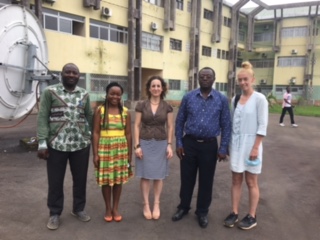Each year the Sparkman Center for Global Health awards mutiple $1,000 Moses Sinkala Travel Scholarships to assist students in completing an international research or internship opportunity. UAB Global Health Studies (GHS) student, Renata Hocking, was awarded the Moses Sinkala Travel Scholarship to assist with her research interests regarding the prevalence of active Schistosoma haematobium infection at the time of delivery in Cameroon. The Sparkman Center for Global Health would like to highlight Ms. Hocking's achievement and her career path in relation psychosocial reseach and improving child supervision. To read Ms. Hockings's account of her career path, please view the piece below:
The purpose of the study Dr. Odom and I designed for my internship, was to assess for the prevalence of active Schistosoma haematobium infection at the time of delivery at the CBCHS facility in Mutengene, Cameroon. A brief survey was administered at the time of presentation or during the hospitalization for facility delivery. The survey asked about demographics, socioeconomic indicators, gynecological/obstetric history, and questions related to awareness of schistosomiasis exposure and prior infection. Then, a small sample of urine was collected for analysis and egg count. RDT malaria testing was performed on each subject. The infant birthweight and maternal gestational age at the time of delivery was captured.
Due to timing of IRB approval I was unable to gather enough data to have statistical significance. In addition, upon arrival in Mutengene it became clear that S. haematobium has a focal endemicity. I spent some time visiting with local researchers at the University of Buea to gain further insight into the distribution and burden of disease on different areas in the region. One researcher was in the middle of a similar study in an area with endemic S. haematobium infection, Munyenge, Cameroon. During my visit to Munyenge I was able to view active infection urine samples and explore the environment and economic setting in which this parasite causes the most problems.
Regardless of the lack of data produced, I gained experience and knowledge in many public health competencies, specifically as they are used in the Global health setting. When I first arrived in Muntengene while waiting for IRB approval, I was busy getting to know the administrative and financial processes of the BHM the hospital in which I would be doing the study. In addition, I spent many days in the maternity ward getting to know the nurses and the birthing process. I got to know the normal procedure for health record keeping, medication administration, and laboratory testing. To perform screening for malaria I spent many days in the laboratory administering RDT malaria tests, in addition to obtaining serum samples for microscopy. I learned to read thick smear slides and count the number of blood cells infected with malaria parasite. The laboratory staff allowed me to use one of their microscopes to perform egg counts from filtered urine samples. The urine sample testing I performed was different than the standard at the laboratory, so I trained a staff member in the lab to perform the test using the equipment I brought, and she shared her standard testing knowledge with me.
Low resource health care and research presents unique challenges. For example, while in the lab I ran into issues that seem obvious now but because of a lack of experience in the setting I did not initially anticipate. There are items in every laboratory in the United States that are disposable and plentiful. Items such as alcohol, bleach, wipes, slides, clean water, etc. I did not anticipate these items being more difficult to obtain. A small bump in the road that allowed me to get to know another aspect of the hospital, it was a good lesson to learn for future studies. While in Kenya I participated in a research project as a volunteer However it was a very well-funded project in an established laboratory. To have the experience of being responsible for my own materials helped me realize the importance of every little detail.
While in Cameroon I also spent time performing HIV testing, community outreach and education. I learned about the experiences of many people living with HIV/AIDS in the region. In attending a conference on implementing viral load testing into local outreach programs I had the opportunity to listen to multiple people tell their stories of how they felt when they found out they were HIV positive. I also learned of their current struggles obtaining medication, making it to health care appointments, and dealing with local discrimination.
The global health internship experience allowed me to write a protocol, submit the protocol for IRB approval, design a survey, implement the protocol, and get to know the policies and health care environment in the Southwest Region of Cameroon. It also allowed me to gain an understanding of government and NGO involvement in preventing parasitic infections, as well as the way in which people in the region feel about different infectious diseases and how those diseases effect their daily lives.
Author: Renata Hocking
 Microscope in Munyenge - because there is no electricity, sunlight is used to view slides - Photo provided by Renata Hocking
Microscope in Munyenge - because there is no electricity, sunlight is used to view slides - Photo provided by Renata Hocking
 HIV community outreach, testing and education day - Photo provided by Renata Hocking
HIV community outreach, testing and education day - Photo provided by Renata Hocking
 Researchers at the University of Buea, showing Renata Hocking how to use urine filtration system, and showing slides containing S. haematobium eggs - Photo provided by Renata Hocking
Researchers at the University of Buea, showing Renata Hocking how to use urine filtration system, and showing slides containing S. haematobium eggs - Photo provided by Renata Hocking

 Photo provided by Renata Hocking
Photo provided by Renata Hocking
 Photo provided by Renata Hocking
Photo provided by Renata Hocking

